Understanding the Messiness of Pet Birds and How to Cope


Intro
Keeping pet birds can be a delightful experience, filled with colorful feathered friends and sweet melodies filling your home. However, the joy of bird ownership comes with an often-overlooked aspect: messiness. From scattered seeds to the occasional droppings, understanding why pet birds can be so messy is crucial for current and prospective bird owners alike. In this guide, we will unpack the various reasons related to birds’ natural behaviors and unique dietary habits that lead to this issue, and we will equip you with solid strategies to maintain cleanliness without compromising their happiness.
Birds are inherently messy due to their instincts and biological traits. Unlike other pets, birds don’t have a natural propensity to keep their living spaces tidy. Instead, they thrive in environments where they can forage, explore, and play. This behavior is part and parcel of their instinctive need to mimic natural behaviors found in the wild, leading to a bit of chaos in the domesticated setting. Let’s dive deeper into the various aspects of bird care that can cultivate a more harmonious balance between keeping a clean home and ensuring that your feathered friends flourish.
Care Tips
Maintaining cleanliness in your bird's environment doesn't have to feel like a Herculean task. Here are some practical tips that can help you manage the mess and keep your space tidy without disrupting your birds' well-being.
Daily Care Routines
Creating a daily care routine is essential. This can include:
- Checking food and water daily to prevent spills.
- Cleaning up scraps after meals, as leftovers can attract pests.
- Offering fresh fruits and veggies at specific times to keep feeding areas cleaner.
These small daily commitments can lead to a more organized environment over time.
Cage Setup and Maintenance
Consider how the setup of your bird's cage contributes to the mess. A well-designed cage can minimize mess:
- Choose cages with removable trays for easy cleaning.
- Opt for cage liners to catch droppings and food spills.
- Arrange food and water dishes away from the perches to reduce scattering.
Hygiene and Cleaning Practices
While a clean home boosts your overall comfort, it's instrumental for your bird's health as well. Incorporate these cleaning practices:
- Use safe, pet-friendly cleaning products.
- Regularly wash toys, perches, and water dishes to eliminate bacteria.
- Schedule deeper cleanings weekly, where you scrub down the cage and surrounding area.
Seasonal Care Adjustments
Environmental changes, like seasonal shedding, can influence the level of mess. During molting periods, your birds may lose feathers more frequently. Adjust your cleaning schedule accordingly by:
- Increasing the frequency of vacuuming in areas where they fly.
- Using lint rollers on your furniture to catch stray feathers.
Behavioral Insights
Understanding the underlying behaviors driving your birds’ messiness can give you valuable insights on how to manage it effectively.
Understanding Bird Body Language
Birds communicate much through body language. Pay attention to their movements, as these can indicate stress or boredom, which might contribute to messier behaviors. For example:
- Flapping wings or excessive vocalizations can signal agitation.
- Biting or throwing food can be a sign of discontent or playfulness.
Common Behavioral Issues and Solutions
Some birds may develop habits that contribute to their mess. If your bird is a prolific shredder or flinger of food, try:
- Providing shreddable toys to redirect their energy.
- Establishing a designated play area for messy activities.
Positive Reinforcement Techniques
Using positive reinforcement can help minimize unwanted behaviors. For instance:
- Reward your bird with a treat when they eat from their bowl rather than throwing seeds.
- Encourage desired behaviors by praising them when they play with toys rather than scattering food.
Social Interaction Needs
Birds are social creatures and thrive on interaction with their owners. Lack of interaction can lead to stress behaviors, increasing messiness. Ensure:
- You engage your feathers in activities daily.
- Consider setting up a play area separate from their cage where they can stretch their wings.
Nutrition Guides
Feeding your bird appropriately is another critical factor in messiness. Understand their dietary needs to better manage the mess they create during feeding.
Essential Diet Components
A balanced diet should include:
- High-quality pellets that provide necessary nutrition.
- Fresh fruits and vegetables that serve as healthy snacks, but do note they can be messy.
- Seeds as occasional treats – but they can lead to more waste if not monitored tightly.
Safe and Toxic Foods
Familiarize yourself with safe foods that you can offer. Common fruits like apples (without seeds), carrots, and leafy greens are great, while others, like avocado or chocolate, can be toxic. Be on point with this for their well-being.
Supplements and Treats
Birds may benefit from supplements, but they can also add to the mess. Ensure:
- Treats are given on a limited basis and at specific times to minimize scattering.
Feeding Strategies for Different Species
Different bird species have varying dietary needs. Research the optimal feeding strategies for your particular bird type to maintain dietary balance while reducing waste.
Wellness and Health
Introducing routine health checkups ensures your bird stays in peak condition—and can also help in managing messiness caused by health issues.
Routine Health Checkups
Regular veterinary visits allow for early detection of health problems. Create a schedule for:
- Annual visits with an avian vet.
- Monitoring weight and general health at home.
Identifying Symptoms of Illness
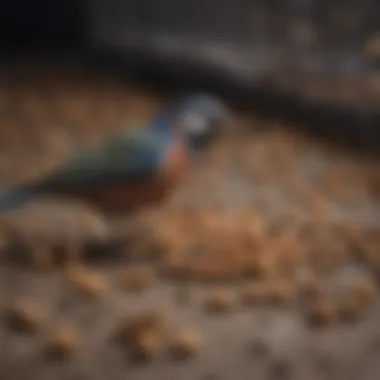
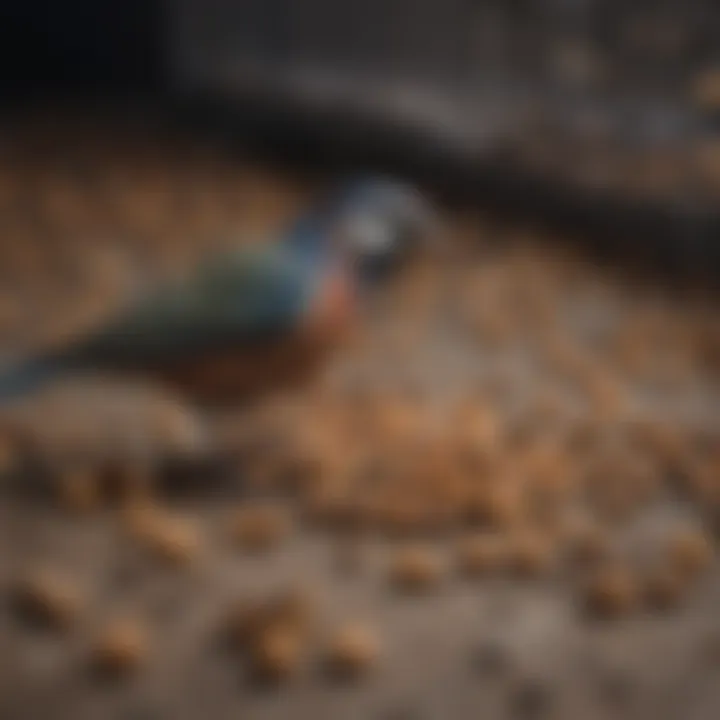
Birds often hide their illnesses. Learn to recognize signs such as:
- Changes in droppings or eating habits.
- Increased lethargy or vocalization, all of which could lead to additional messiness if their health deteriorates.
Preventative Care and Vaccinations
Prevention is key. Ensure:
- Your bird receives all recommended vaccines.
- Regular parasite checks to maintain their health.
Mental and Emotional Well-being
Maintaining your bird's emotional health can significantly affect their behavior and, in turn, the mess generated in your home. Incorporate:
- Interactive toys to stimulate them mentally.
- Regular bonding activities to foster an emotional connection.
Enriching Activities
Enrichment activities play a massive role in controlling messiness by keeping your bird stimulated and content.
Toys and Playtime Ideas
Rotating toys and playtime activities can keep them engaged. Consider:
- Offering a variety of toys, from foraging to chew toys.
- Setting up regular playdates with other birds if possible (and safe).
Training and Tricks
Train your bird in fun, engaging ways. Teaching tricks can be beneficial:
- It provides physical activity and mental stimulation.
- Helps deter destructive behaviors that could create mess.
Outdoor Activities and Interaction
Taking your bird outside (safely) can be a fantastic way to enrich their lives:
- Utilize a bird harness for safe outdoor exploration.
- Setting up an outdoor aviary can offer fresh air and sunlight.
DIY Projects for Mental Stimulation
Get creative! DIY projects can stimulate your bird's mind. Ideas include:
- Creating foraging puzzles using simple household items.
- Building a bird gym to encourage movement and play.
Through understanding the messiness related to pet birds and applying these tips and insights, you’re better equipped to create an environment that benefits both your living space and your feathered companions. As you nurture their needs while addressing cleanliness, you're setting the stage for a happy, harmonious cohabitation.
Prologue to Pet Birds
Pet birds have become cherished companions for many people. They can fill homes with cheerful melodies and vibrant colors, but their presence is not without challenges. Understanding the myriad aspects that come with bird ownership is essential. It goes beyond just feeding and care; it encompasses a deep dive into their behavior, living environment, and even the messiness they seem to bring along. This section sets the stage for a comprehensive exploration of these fascinating creatures, offering insights that can help current and aspiring bird owners navigate the complexities of pet bird care.
Defining Pet Birds
In a broad sense, pet birds encompass various species that have been domesticated or socialized enough to thrive in human households. This includes everything from the chatty budgerigar to the striking macaw. These creatures have unique characteristics that influence their behavior, needs, and care routines. Knowing what defines a pet bird—such as their social nature, vocalizations, and dietary preferences—helps owners better understand and cater to their needs. Key points to consider include:
- Species Variety: Not all birds are created equal. Some, like cockatiels, are known for their affectionate nature, while others, such as canaries, might be more independent.
- Lifespan: Many pet birds have long lifespans, making them a long-term commitment.
- Social Needs: Birds are inherently social creatures, which means they often require interaction, either with their human caregivers or with other birds.
Knowing these defining elements allows pet owners to create an enriching environment that caters to the well-being of their avian friends.
The Popularity of Bird Ownership
The allure of keeping birds as pets has soared in recent years. There are several factors contributing to this spike in popularity:
- Companionship: For individuals craving companionship but who might have limited space, birds can fit perfectly into smaller living conditions. They provide company without the extensive space requirements that dogs or cats need.
- Low Maintenance: Compared to some traditional pets, certain bird species can be easier to care for. They don’t require walks or extensive grooming routines. However, this should not be mistaken for low commitment.
- Educational Value: Birds can be fascinating subjects for learning. Their behavior, vocalization, and needs can capture the interest of enthusiasts and families alike.
"Birds not only bring joy to homes, they can also foster a sense of responsibility and compassion in families, especially children."
The growing trend is reflective of a desire for connection in today’s fast-paced world. Still, it’s crucial for potential owners to recognize and respect the complexities that these beautiful creatures bring into their lives. Each bird is a unique individual with specific needs, and addressing these needs thoughtfully is key to creating a harmonious home.
Understanding Bird Behavior
Understanding bird behavior is crucial for any pet bird owner or aspiring bird parent. Birds exhibit a variety of natural instincts and patterns that stem from their wild ancestors. These behaviors impact not only the way birds interact with their environment but also how they live in captivity. Recognizing these instincts allows owners to create a nurturing and stimulating habitat. Moreover, understanding bird behavior helps in managing the inevitable messiness that accompanies bird ownership.
As we delve deeper into this topic, we will examine various aspects that shed light on why our feathery friends can be so messy.
Natural Instincts at Play
Birds are inherently driven by instincts that have evolved over millions of years. It is essential to grasp these natural inclinations to comprehend their sometimes chaotic behavior. For instance, birds like parrots often exhibit strong flocking instincts, leading them to seek social interaction. In the wild, they would forage, communicate, and groom collectively.
This instinct can manifest within our homes, creating a vibrant, albeit messy, atmosphere. The need to be social makes them prone to scatter food and debris as they engage in their spirited activities. For example, a lively interaction among two cockatiels might result in an explosion of seed hulls and feathers on the floor, highlighting their playful, social nature.
- Flocking Behavior: Birds thrive in groups, which can lead to a more significant mess when they engage together.
- Foraging Needs: As they search for food, they inevitably toss seed shells and pieces everywhere.
Feeding and Foraging Habits
The way birds feed is as varied as the species itself, but one common thread is their instinctual drive to forage. Many pet birds still retain the natural behavior of rummaging for food just like in the wild. This encompasses not only their selection of food but also the method by which they consume it.
For instance, a budgerigar might vigorously shake its head while eating, sending bits of seed flying in all directions. This behavior is a reminder of their active lifestyle and need for mental stimulation. Pet owners should recognize that feeding habits contribute significantly to household mess.
Owners might consider employing a few strategies to minimize mess:
- Foraging Toys: Encourage birds to find food instead of scattering it everywhere. Use toys that require effort to access food—this promotes mental health and controls messiness.
- Designated Feeding Areas: Set up specific spots where feeding takes place, perhaps with a mat underneath to catch droppings and shells.
Preening and Dust Production
Preening is an essential behavior for birds. It serves to keep feathers healthy and clean while also providing a soothing ritual. However, it also produces dust and feathers that find their way into living spaces.
Each bird species has its unique preening habits. For example, cockatoos are known for their penchant for creating clouds of dust in the process of maintaining feather health. This dust can accumulate, leading to potential allergens in the home.
A few important points to consider include:
- Allergen Awareness: Understanding the dust production helps in managing allergy triggers for both the birds and their owners.
- Regular Cleaning: Owners must adopt a consistent cleaning routine to mitigate dust build-up while accommodating the birds’ preening needs.
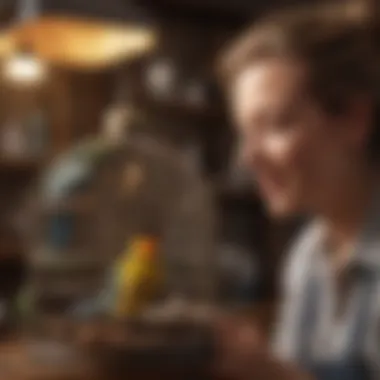
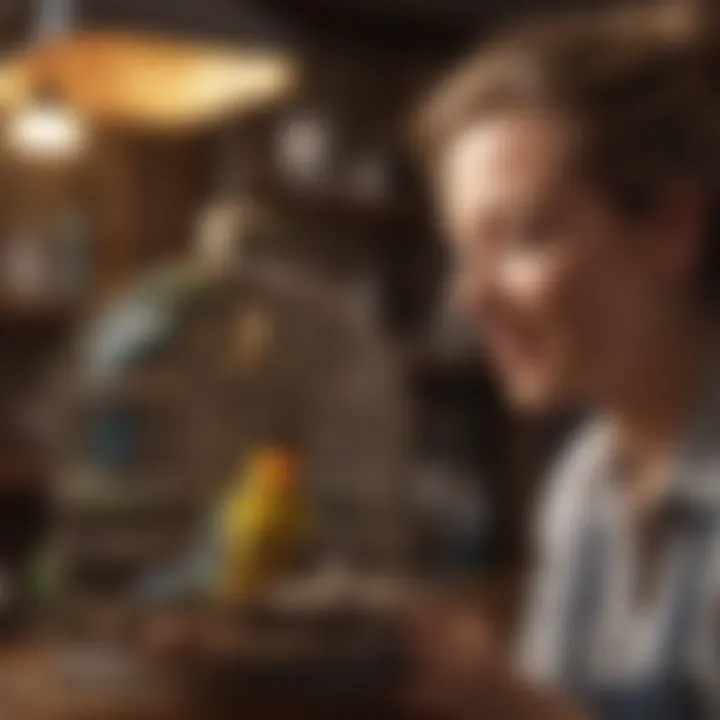
In summary, grasping the intricacies of bird behavior is not just about understanding your feathered friend better; it also translates to managing the mess that comes with it. Informed owners can balance their pet's needs while crafting a cleaner environment—after all, a little mess can lead to a lot of joy.
Dietary Contributions to Messiness
The dietary habits of pet birds play a pivotal role in understanding the messiness that often comes with bird ownership. Not only do these tiny creatures have unique eating preferences, but their natural instincts also dictate how they consume food. As a bird owner, recognizing these dietary contributions offers a window into managing cleanliness while still catering to their needs.
Types of Foods Preferred
Birds are naturally drawn to a broad spectrum of foods, which can vary widely based on their species. Parrots, for instance, enjoy a colorful array of fruits, vegetables, and nuts, often creating a delightful medley of textures and tastes. Finches, on the other hand, typically lean towards seeds, which they’ll enjoy in quite a different manner.
The sheer variety can lead to quite a mess. When crunching on seeds or ripping into fruits, crumbs can scatter everywhere, leaving remnants that may surprise a bird lover catching them off-guard. It's something many new owners may not expect:
- Fruits and Vegetables: Take a bite out of an apple, and you’ll quickly notice how they can send bits flying.
- Seeds: A few errant shells and you have a mini explosion of debris.
- Pellets: They might seem tidy, but when birds decide to break them apart, you’d guess that the cleanest option isn’t so clean after all.
Seed vs. Pellets
When it comes to feeding pet birds, a common debate revolves around seeds versus pellets. Seeds can often be a preferred choice, but they bring their messy baggage along.
Seeds tend to be high in fats and low in essential nutrients. Birds will eat and discard the shells, which can pile up in corners of the cage or on whatever surface is below. On the flip side, pellets prefer to offer a balanced diet, but they can also contribute to the overall messiness.
- Seeds: Owners should note that while birds may enjoy them, the shells often cling to feathers, fall to the floor, and create additional work for cleanup. They’re often more excited, which leads to a more chaotic eating experience.
- Pellets: While less messy in terms of shells, they can easily turn into dust through the pecking and breaking process, makind them just as messy over a different timeline.
Messy Eating Patterns
Birds are not dainty eaters, and understanding their eating patterns can be key to mitigating messiness. When birds forage, they often engage in behaviors that seem chaotic and, at times, downright messy. For instance, they can shovel food into their beaks and let excess tumble down like a snowstorm of bits.
Consider the following behaviors:
- Foraging: Many birds flourish in a foraging environment where they dig through food. This can turn into a rather animated event, flinging not just food but also bedding material all around.
- Picking and Discarding: Birds often pick apart their food and only consume the most appealing parts, leaving a trail of refuse behind.
- Social Eating: If you’re fortunate enough to have multiple birds, their competitive eating can ramp up the mess tenfold. They’re more likely to toss food around just to claim their share.
Regularly monitoring your bird’s eating patterns can help identify habits leading to mess. Each little crumb tells a story about their experience, and understanding that can make the cleanup less daunting.
In sum, the food preferences and habits of birds contribute significantly to the messiness of pet ownership. By being aware of what birds eat, how they interact with their food, and their foraging instincts, owners can better prepare for the inevitable chaos that accompanies these lively companions.
The Role of Aviary Setup
In the complex world of pet birds, the setup of their living environment plays a crucial role in their well-being and the messiness associated with their care. It's not just a matter of having a cage; it's about how that cage integrates into the broader scheme of the bird's life. This section delves into various factors of the aviary setup that contribute to both the cleanliness of the space and the health of the birds.
Cage Size and Design
A bird's cage is more than just a home; it's a playground, a sanctuary, and a space for growth. Start with the size — a cage that's too small can leave a bird feeling cramped and stressed. A good rule of thumb is that bigger is usually better. The minimum dimensions should allow the bird to spread its wings fully and move around comfortably. Different species require varying space; for instance, a parakeet might flourish in a cage that's at least 24 inches wide, while larger parrots need even more expansive surroundings.
Design matters just as much; bars should be spaced appropriately to prevent escape or injury. Cages with horizontal bars allow for climbing, which birds enjoy. Of course, it's also about aesthetics; a visually appealing cage with clean lines can be more enticing in your living space.
"A substantial space fosters not only physical health but also mental stimulation, making for happier, less messy birds."
Accessories and Enrichment
Birds are naturally curious and intelligent creatures, so providing them with accessories and enrichment is essential. Simple toys can do wonders, but be careful to choose options that don’t shed materials all over the place. Wooden toys, for instance, can produce splinters, leading to cleanup hassles, while plastic ones can be easily washed.
Consider offering perches of varied thickness. Natural branches not only look more organic but usually come with additional benefits. They often have a better grip, which helps with foot health. Food and water containers should be easy to access yet secure enough to avoid spilling, as messy feeding can lead to a rapid increase in potential cleanup tasks.
Moreover, consider integrating foraging opportunities. This means hiding food inside toys or providing shreddable materials where birds can explore and manipulate their environment. This not only helps with keeping them engaged but also minimizes messes made from scattered food.
Location of the Aviary
Where you place the aviary impacts everything from the bird's mood to the level of mess you deal with. Avoid putting cages in high-traffic areas where loud noises can startle birdies. Instead, opt for quieter corners of your home.
Ensure that the location has adequate lighting without harsh direct sunlight, which can overheat the birds. Ventilation is also essential; a well-ventilated space keeps the air clean, reducing dander accumulation and creating a healthier environment.
Lastly, bear in mind ease of access for cleaning. The closer the cage is to your cleaning supplies, the quicker you can get rid of droppings and spilled grains.
Ultimately, the effectiveness of your bird setup will hinge on how well these elements work together. By investing thought and effort in the aviary design and care routine, you can significantly reduce the mess that comes with pet birds while ensuring they thrive in a welcoming atmosphere.
The Impact of Social Interaction
When it comes to keeping pet birds, social interaction plays a pivotal role. Birds are social creatures by nature, thriving in environments where they receive consistent social feedback and companionship. When pet owners engage with their birds, it fosters a connection that can change the bird’s behavior significantly. An understanding of this interaction is critical for creating a harmonious living space.
Birds can be quite adaptive but will often act out if their social needs are neglected. Their social structures in the wild suggest that birds engage in activities alongside their flock, whether it be foraging, playing, or grooming. Thus, when a bird feels isolated, it might express its discomfort through vocalizations or erratic behavior, which can lead to an increase in messiness around the home as they attempt to attract attention or cope with boredom.
Consequently, ensuring that your bird has ample social interaction is not only beneficial for its mental health but also aids in potentially mitigating the messiness associated with these lovable pets. Regular engagement keeps them busy, reduces stress-driven behaviors, and can instill a sense of security.
Behavioral Changes with Interaction
Interactions between birds and their owners can lead to noticeable changes in behavior. Here are some examples of how these changes manifest:
- Enhanced Trust: Over time, an interactive relationship builds trust. You might notice your bird becoming more comfortable with handling, reducing the likelihood of stressful situations that could lead to mess.
- Playful Demeanor: Birds that receive stimulation from their owners are often livelier, demonstrating playful behaviors. They’re less likely to engage in destructive activities that create a mess in the home.
- Decreased Aggression: Regular communication and interaction can help tame aggressive tendencies. A socialized bird is often more relaxed and easy-going compared to a solo, isolated bird.
It's essential to create opportunities for interaction, be it through simple daily chats, training sessions, or even mutual playtime with toys. This not only keeps the bird entertained but also strengthens your bond.
Stress and Its Effects on Cleanup
Now, let’s tackle the flip side of social interaction—the stress that sometimes arises from inadequate engagement. Stress is a silent yet potent influence on a bird's cleanliness habits and the overall messiness in your space. Here are a few ways stress can directly correlate to messiness:
- Increased Feather Dust: Stressful situations can trigger molting or increased preening, leading to a rise in feather dust and dander around your home. This can aggravate allergies and increase cleanup demands.
- Messy Eating Habits: A bird under stress may display uncharacteristic feeding behaviors. Instead of eating generally, they might scatter their food everywhere, making cleanup a chore.
- Vocalization and Chewing: In an effort to relieve stress, some birds may chew on their cage or surroundings, causing litter and debris. Constantly breaking items can lead to more cleanup and frustration.
To alleviate stress-related mess, recognize signs early and respond with increased interaction or environmental enrichment. A happy bird minimizes clutter, keeping both them and their owners content.
Seasonal Factors in Messiness
Understanding seasonal factors in how pet birds contribute to a mess is crucial for owners who want to maintain a clean living environment while ensuring their avian friends thrive. Birds, like many creatures, are influenced by changes in weather and natural cycles. The implications of molting or fluctuations in temperature can drastically alter their behavior. It’s not just about the feathers that litter the cage or the food scattered around; it intertwines with their well-being and how they interact with their surroundings.
Molting Periods
Molting is a natural and necessary process for birds, where they shed old feathers and grow new ones. This happens at least once a year, and depending on the species, it can vary in intensity and duration. During molting, a bird can lose a significant amount of feathers, leading to quite a noticeable mess. Owners may find themselves cleaning up more than usual as stray feathers coat the floor, furniture, and any area where the bird roams.
During this period, birds often behave differently; they can become a little irritable or less social. Less interaction results in more feathers falling off as they have less to keep them entertained, leading to frustration. Understanding this phase helps owners prepare adequately, both mentally and in terms of cleanup. A good practice is setting up a designated area with easily cleanable surfaces, making it simpler to manage the mess that accumulates.
"Feathers are a part of their lives, but during molting, it can feel like you’re sharing your home with a feather pillow!"
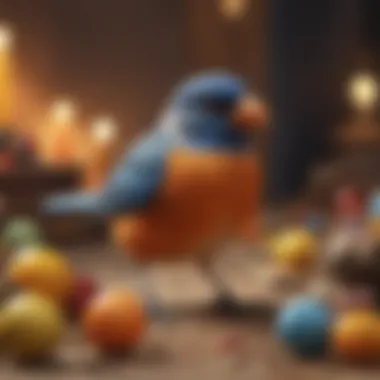
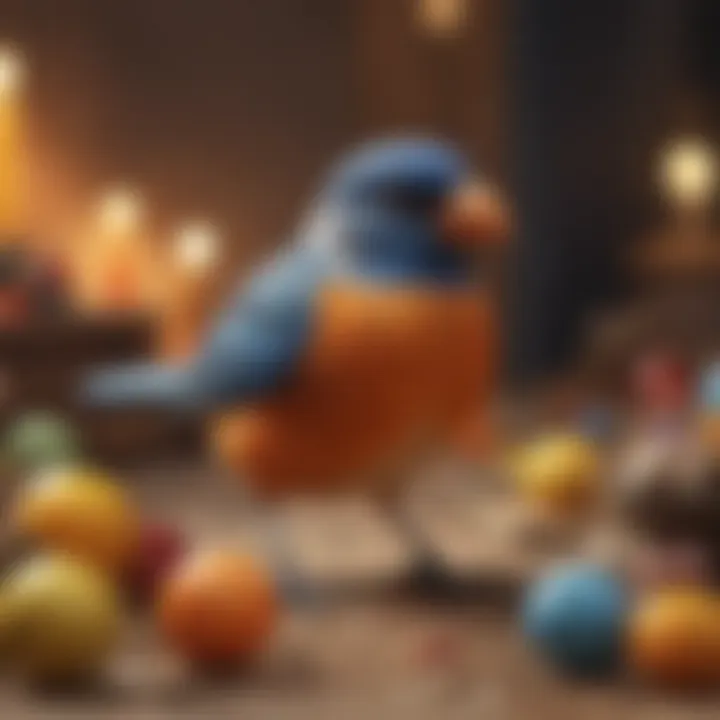
Here are some pointers for navigating the molting season:
- Regularly check for loose feathers and vacuum frequently.
- Provide plenty of enrichment to keep your bird engaged. This can help reduce the feathers they drop.
- Consider covering areas with easily washable materials.
Weather Influences on Behavior
Weather can significantly affect bird behavior, which in turn impacts messiness. Predictions of rain or extreme temperatures might make a bird restless or anxious, causing them to be more active and messy in their habitats. For instance, when days are too cold or unpleasant, birds may stay indoors more, leading to a concentrated area of droppings and scattered food.
These are a couple of aspects to keeping in mind as weather changes:
- Temperature Fluctuations: Birds can become more stressed in extreme heat or cold, which may lead to chaotic behaviors, including throwing food around.
- Humidity Levels: High humidity can lead to an uptick in dust and dander, while low humidity might make feathers fluffier, both of which can lead to an increase in mess.
Caring for birds during fluctuating weather doesn't have to be a headache. Here are several strategies:
- Monitor the temperature in your bird’s environment. Use a thermometer or a hygrometer to keep checks on living conditions.
- Adjust their diet based on the weather; during hot days, birds may enjoy hydrating fruits and vegetables more than heavier seeds.
- Increase cleaning frequency if a particular weather pattern seems to escalate mess levels.
Being mindful of how seasonal changes impact bird behavior allows owners to make proactive adjustments in their care and cleaning regimens, leading to a cleaner, healthier home for both the owner and the pet.
Mitigating the Mess
When it comes to pet birds, tidiness may seem like an elusive concept. Mitigating the mess is not just about maintaining a clean environment; it’s also a critical factor in ensuring the overall health and happiness of your feathered companions. Understanding why mess occurs can help owners devise practical strategies to create a better living situation for both the birds and themselves. This section offers insights into effective cleaning techniques and the right products that can help keep your space tidy without compromising on the well-being their pet birds need.
Cleaning Strategies for Bird Owners
Keeping a clean home when sharing your space with birds can be a daunting task, but it is far from impossible. Here are some effective cleaning strategies for bird owners:
- Daily Spot Cleaning: This is the bread and butter of maintaining cleanliness. Removing droppings, food debris, and feathers regularly can vastly improve overall hygiene. A handheld vacuum or a damp cloth can be quite handy.
- Cage Maintenance: It’s essential to remove all accessories and clean the cage on a weekly basis. Use natural or bird-safe cleaning solutions. Vinegar and water can do wonders without the harsh chemicals that might harm your bird.
- Utilizing Liners and Mats: Consider placing disposable or washable liners at the bottom of the cage. They can trap mess, making your cleaning routine much quicker.
- Setting a Schedule: Stick to a regular cleaning schedule that aligns with your birds’ habits. For instance, cleaning after feeding times can minimize the mess significantly.
"Consistency is the name of the game. A little effort every day will save you a mountain of work in the long run."
Such methods not only help keep things cleaner but also reduce the stress levels of your birds, allowing them to feel more comfortable in their surroundings.
Choosing the Right Products
Selecting appropriate cleaning products is pivotal when managing a space that houses pet birds. It's not merely about effectiveness but also safety.
- Bird-Safe Cleaners: Opt for non-toxic cleaners specifically designed for pet birds. Products like Simple Green and Vet’s Best are popular among bird owners.
- Disinfectants: Ensure that any disinfectant used is safe for avian environments. Look for natural enzymatic cleaners that safely eliminate germs without leaving harmful residues.
- Cleaning Tools: Invest in tools that are effective yet gentle. For instance, soft brushes and microfiber cloths can prevent scratching while being efficient in lifting dirt and dust.
- Storage Solutions: Maintain organization with dedicated cleaning supplies. A caddy or basket specifically for bird hygiene can streamline your efforts and avoid mixing cleaners with other household products.
Summary
By employing consistent cleaning strategies and choosing the appropriate products, bird owners can significantly mitigate the messiness associated with pet birds. A clean living environment doesn’t only benefit the owner; it fosters a healthier place for the birds, allowing them to thrive in their space. An organized approach is paramount to navigate the quirks of bird ownership while ensuring both cleanliness and comfort.
Best Practices for Bird Care
Bird care is a multilayered endeavor, fraught with challenges and joys alike. For pet bird owners, the messiness that accompanies bird ownership can be daunting. Therefore, adopting sound practices not only contributes to a cleaner environment but also ensures the well-being of these vibrant companions. Simply put, knowledge is power; when you arm yourself with the right strategies, you can navigate the chaos of pet ownership more effectively.
Creating a Balanced Environment
An effective and harmonious living space for your birds starts with the environment you curate. It's essential to realize that a balanced environment caters to both the physical and emotional needs of your feathered friends. A spacious, stimulating habitat allows birds to express their natural behaviors, like flying, foraging, and exploring. Here’s how you can achieve a well-rounded setup:
- Cage Size and Type: Larger cages are preferable for species that enjoy flying. Choose cages with horizontal bars; they promote climbing and excercise.
- Natural Elements: Incorporate safe branches, perches, and toys. These elements mimic their natural habitat, providing both comfort and entertainment.
- Diverse Enrichment: Rotate out toys and introduce new items regularly to maintain their curiosity. Items like bells, swings, or puzzle feeders can prevent boredom.
- Safe Space: Ensure that your birds can have quiet, safe places to retreat when they feel stressed. Providing hideaways or shaded areas within the cage can give them that needed respite.
By thoughtfully considering each aspect of their environment, you create a space that not only reduces messiness but also fosters healthy habits and behaviors in your birds.
Establishing Routines for Hygiene
With cleanliness as a primary concern for bird owners, establishing routines is a game changer. Regular maintenance keeps messiness at bay, but it relies on a structured approach that includes daily, weekly, and monthly tasks. Here’s a breakdown of actionable steps:
- Daily Spot Cleaning: Make it part of your morning routine to check the cage for uneaten food, droppings, and shredded material. Using a handheld vacuum can save time.
- Weekly Deep Cleaning: Remove the birds from their cages and clean all surfaces, including the bottom tray, perches, and toys. A solution of vinegar and water is both effective and safe.
- Monthly Overhaul: This includes replacing old toys, checking for wear and tear in the cage, and rearranging perches to keep the environment engaging.
“A clean cage is a happy bird. Regular attention to hygiene contributes to the overall health of your birds.”
In essence, creating and sticking to cleaning schedules not only alleviates the burden of excessive mess but also minimizes health risks for your birds. These practices enhance their quality of life, giving owners peace of mind amid the delightful chaos of bird ownership.
Long-term Considerations
Understanding the long-term considerations of owning pet birds is crucial for aspiring bird parents, enthusiasts, and breeders alike. The responsibility of bird ownership extends beyond the initial excitement of bringing a new feathered friend into your home. It calls for an ongoing commitment to both the well-being of your birds and your living environment.
The messiness associated with birds often doesn't just represent a momentary hassle; it can have lasting implications on your household, mental state, and your birds’ happiness. As such, recognizing this aspect early can help equip owners with strategies to create a harmonious living situation.
Assessing the Impact of Messiness on Ownership
When considering bird ownership, it's important to evaluate how messiness may affect your lifestyle and living space. Bird owners often encounter a variety of challenges, ranging from seed hulls scattering around the house to the occasional bird droppings. Assessing these factors involves reflecting on how they can impact routines and relationships within the home.
Factors to consider include:
- Time Commitment: Regular cleaning takes time, and owners should be prepared to integrate this into their daily or weekly routines.
- Space Limitations: Small apartments or compact homes may find it more difficult to manage the mess of pet birds compared to larger living situations.
- Allergies and Health: Dust and dander from birds can impact those with allergies. It's essential to consider the health implications that pet birds present, both for the owner and family members.
It's vital to weigh these elements against the joy that comes from having a bird companion. Despite the mess, many find that the rewards of companionship and the lively antics of their pets far outweigh any hassles.
Adjustments Over Time
As time goes on, both the birds and their owners will likely adapt to each other. Adjustments are necessary to accommodate the evolving needs of your avian friends, as well as your own preferences regarding cleanliness.
Birds undergo various life stages, which can influence messiness in distinct ways. For instance, younger birds might be more curious and, consequently, messier, while older birds could have more settled habits. Thus:
- Routine Adjustments: As you understand your bird's behaviors and patterns better, it can be helpful to adjust feeding routines, cleaning schedules, and playtime to minimize mess.
- Environmental Changes: You might find that changing the cage setup or moving the aviary to a new location can alleviate some messes—such as relocating it to a more easily cleanable area.
- Behavioral Training: Birds are trainable creatures, and with patience and time, you might successfully instill certain habits that can minimize their mess—like teaching them to eat in designated areas.
Ultimately, being flexible and adaptive is key to managing a long-term relationship with your pet birds. As they settle in and you find your rhythm, you will learn to create an environment where cleanliness doesn’t overshadow the joy of bird ownership.
The journey with pets is never a straight path; it’s filled with twists and turns that make the experience all the more rewarding.
Epilogue
In wrapping up the exploration of pet bird messiness, it’s vital to underscore just how central this topic is to the relationship between birds and their owners. Messiness is not merely a nuisance; it's a reflection of the vibrant, complex beings that pet birds are. They exhibit natural behaviors that are inherently messy, yet these behaviors—like foraging, preening, and social interactions—are crucial to their welfare.
Understanding that messiness signals a thriving bird can change the way owners perceive this phenomenon. Adjusting one’s expectations and approach can lead to a more harmonious living environment for both the pet and the owner. Dedicating time to implementing effective cleanup strategies, such as routine cage maintenance and targeted dietary choices, not only helps mitigate the litter but also promotes the overall health and happiness of the bird.
Benefits of Addressing Messiness
- Enhanced Bird Health: A cleaner environment reduces risks associated with pests and bacteria.
- Peace of Mind for Owners: Knowing that one has strategies in place can alleviate stress.
- Better Relationship with Pets: Understanding the reasons behind their mess encourages empathy and improves bonding.
Considerations
- Prioritizing bird care and understanding behavioral cues can lead to a less messy home.
- Community resources, like forums on sites such as Reddit, can provide real-world advice from experienced bird owners on how to deal with the unavoidable mess.
"The messiness of pet birds, while initially daunting, offers an opportunity for deeper insight into their natural behaviors, ultimately enhancing the bond between owner and avian companion."















